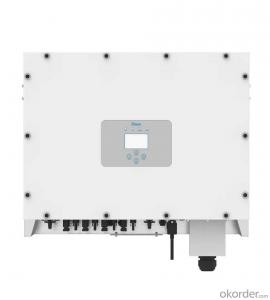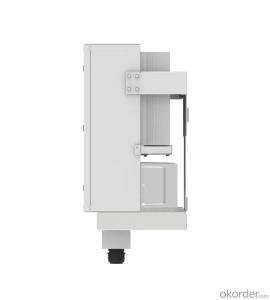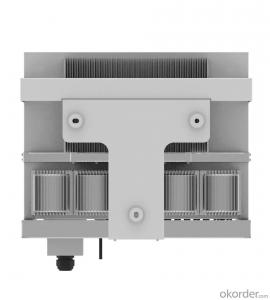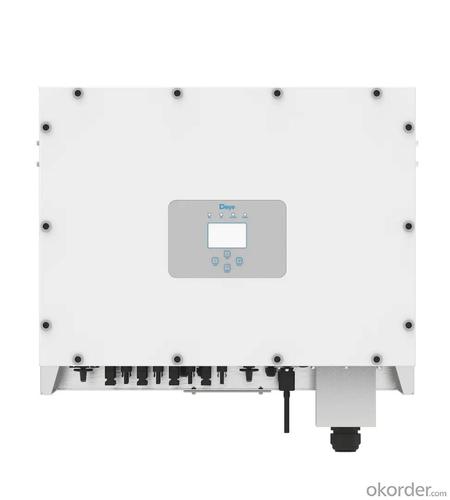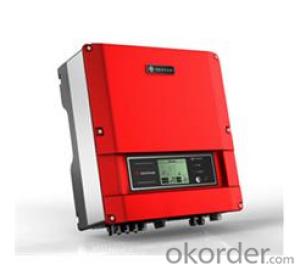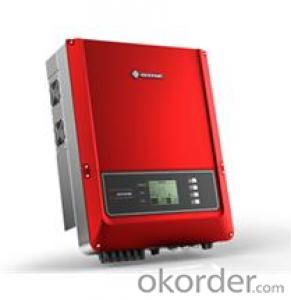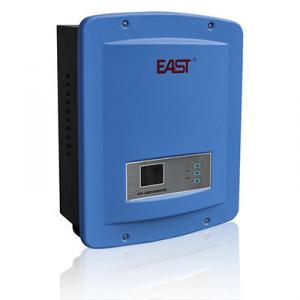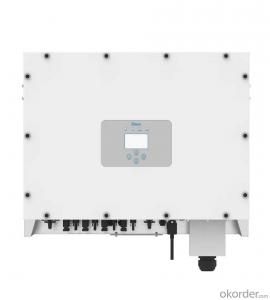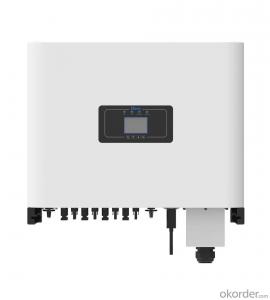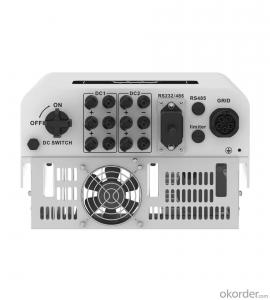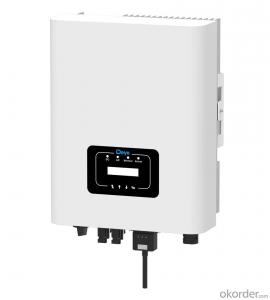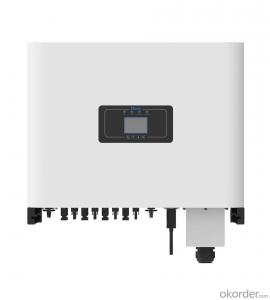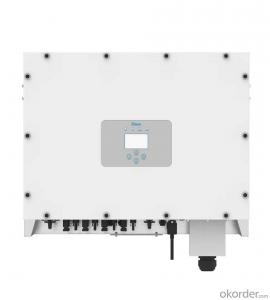Solar Inverter EMI Sun-35/40/45/50k-g-lv | 35-50kW | Three Phase | 4 MPPT | Low Voltage | 127/220VAC
- Loading Port:
- Ningbo
- Payment Terms:
- TT OR LC
- Min Order Qty:
- 100 pc
- Supply Capability:
- 5000 pc/month
OKorder Service Pledge
OKorder Financial Service
You Might Also Like
Specification
This series inverter is specially designed for 127/220Vac three-phase system, providing rated power at 35KW, 40KW, 45KW, 50KW. Equipped with large LCD and buttons, easy to operate and maintenance. With compact design and high-power density, this series supports 1.3 DC/AC ratio, saving device investment.
127/220Vac and 60Hz, three phase system
4 MPP tracker, Max. efficiency up to 98.7%
Zero export application, VSG application
String intelligent monitoring (optional)
Wide output voltage range
Type II DC/AC SPD
Anti-PID function (Optional)
| Technical Data | ||||||
| Model | SUN-35K-G02-LV | SUN-40K-G-LV | SUN-45K-G-LV | SUN-50K-G-LV | ||
| Input Side | ||||||
| Max. DC Input Power (kW) | 45.5 | 52 | 58.5 | 65 | ||
| Max. DC Input Voltage (V) | 800 | |||||
| Start-up DC Input Voltage (V) | 250 | |||||
| MPPT Operating Range (V) | 200~700 | |||||
| Max. DC Input Current (A) | 30+30+30+30 | 40+40+40+40 | ||||
| Max. Short Circuit Current (A) | 45+45+45+45 | 60+60+60+60 | ||||
| Number of MPPT / Strings per MPPT | 4/3 | 4/4 | ||||
| Output Side | ||||||
| Rated Output Power (kW) | 35 | 40 | 345 | 50 | ||
| Max. Active Power (kW) | 38.5 | 44 | 49.5 | 55 | ||
| Nominal Output Voltage / Range (V) | 3L/N/PE 127/0.85Un-1.1Un,220 /0.85Un-1.1Un (this may vary with grid standards) | |||||
| Rated Grid Frequency (Hz) | 60 / 50 (Optional) | |||||
| Operating Phase | Three phase | |||||
| Rated AC Grid Output Current (A) | 91.9 | 104.9 | 118.1 | 131.2 | ||
| Max. AC Output Current (A) | 101.1 | 115.5 | 129.9 | 144.4 | ||
| Output Power Factor | 0.8 leading to 0.8 lagging | |||||
| Grid Current THD | <3%< span=""> | |||||
| DC Injection Current (mA) | <0.5%< span=""> | |||||
| Grid Frequency Range | 57~62 | |||||
| Efficiency | ||||||
| Max. Efficiency | 98.7% | |||||
| Euro Efficiency | 98.3% | |||||
| MPPT Efficiency | >99% | |||||
| Protection | ||||||
| DC Reverse-Polarity Protection | Yes | |||||
| AC Short Circuit Protection | Yes | |||||
| AC Output Overcurrent Protection | Yes | |||||
| Output Overvoltage Protection | Yes | |||||
| Insulation Resistance Protection | Yes | |||||
| Ground Fault Monitoring | Yes | |||||
| Anti-islanding Protection | Yes | |||||
| Temperature Protection | Yes | |||||
| Integrated DC Switch | Yes | |||||
| Remote software upload | Yes | |||||
| Remote change of operating parameters | Yes | |||||
| Surge protection | DC Type II / AC Type II | |||||
| General Data | ||||||
| Size (mm) | 700W×575H×297D | |||||
| Weight (kg) | 60 | |||||
| Topology | Transformerless | |||||
| Internal Consumption | <1W (Night) | |||||
| Running Temperature | -25~65℃, >45℃ derating | |||||
| Ingress Protection | IP65 | |||||
| Noise Emission (Typical) | <55 dB | |||||
| Cooling Concept | Smart cooling | |||||
| Max. Operating Altitude Without Derating | 2000m | |||||
| Warranty | 5 years | |||||
| Grid Connection Standard | CEI 0-21, VDE-AR-N 4105, NRS 097, IEC 62116, IEC 61727, G99, G98, VDE 0126-1-1, RD 1699, C10-11 | |||||
| Operating Surroundings Humidity | 0-100% | |||||
| Safety EMC / Standard | IEC/EN 61000-6-1/2/3/4, IEC/EN 62109-1, IEC/EN 62109-2 | |||||
| Features | ||||||
| DC Connection AC Connection Display Interface | MC-4 mateable IP65 rated plug LCD 240 × 160 RS485/RS232/Wifi/LAN | |||||
| AC Connection | IP65 rated plug | |||||
| Display | LCD 240 × 160 | |||||
| Interface | RS485/RS232/Wifi/LAN | |||||
- Q: How does a solar inverter handle anti-islanding protection?
- A solar inverter handles anti-islanding protection by constantly monitoring the grid voltage. If the grid goes down or voltage drops below a certain threshold, the inverter automatically disconnects from the grid to prevent feeding power back into the grid during an outage. This ensures the safety of utility workers and prevents damage to the grid.
- Q: How the output voltage of the PV inverter and the grid-connected voltage are determined
- due to the higher penetration rate of the car to go out to work or travel can be connected with the inverter battery drive electrical and various tools work. The car inverter output through the cigarette lighter is 20W, 40W, 80W, 120W to 150W power specifications. And then a large number of power inverter power
- Q: What is the maximum operating altitude for a solar inverter?
- The maximum operating altitude for a solar inverter typically varies depending on the specific model and manufacturer. However, on average, most solar inverters can operate effectively at altitudes up to 4,000 meters (13,123 feet) above sea level. It is important to consult the manufacturer's specifications or user manual for the precise altitude limitations of a particular solar inverter.
- Q: How does a solar inverter handle low light conditions or cloudy days?
- A solar inverter handles low light conditions or cloudy days by continuously monitoring the incoming solar energy. When there is a decrease in sunlight, the inverter adjusts its voltage and current output to optimize the power conversion. This ensures that even under low light conditions, the inverter can still convert the available solar energy into usable electricity efficiently.
- Q: What is the maximum DC input current for a solar inverter?
- The maximum DC input current for a solar inverter can vary depending on the specific model and manufacturer. It typically ranges from 10 to 60 amps, but it is best to consult the product specifications or contact the manufacturer for the exact maximum DC input current of a particular solar inverter.
- Q: What is the role of a solar inverter in preventing underperformance?
- The role of a solar inverter in preventing underperformance is to convert the direct current (DC) produced by solar panels into alternating current (AC) that can be used to power electrical devices. It ensures optimal performance by tracking the maximum power point of the solar panels, regulating voltage and current levels, and protecting against voltage fluctuations or grid disturbances. This helps to minimize energy losses, enhance system efficiency, and prevent underperformance by ensuring that the solar system operates at its maximum capacity.
- Q: Can a solar inverter be used in conjunction with a generator?
- Yes, a solar inverter can be used in conjunction with a generator. In fact, it is a common practice to combine these two systems to create a hybrid power solution. The solar inverter can convert the direct current (DC) electricity generated by the solar panels into alternating current (AC) electricity, which can be used to power household appliances. When the solar panels do not generate enough electricity, the generator can kick in and provide additional power to meet the demand. This combination allows for a more reliable and efficient power supply, especially in areas with intermittent sunlight or during power outages.
- Q: What is the role of a solar inverter in preventing islanding?
- The role of a solar inverter in preventing islanding is to constantly monitor the electrical grid and immediately disconnect from it if it detects a fault or disruption. By disconnecting from the grid, the solar inverter ensures that it does not continue to generate power and create a self-sustaining island of electricity, which could pose a safety risk for utility workers attempting to fix the fault.
- Q: What are the key factors affecting the reliability of a solar inverter?
- The key factors affecting the reliability of a solar inverter include the quality of components used, design and manufacturing processes, environmental conditions, maintenance practices, and the level of protection against electrical faults.
- Q: What is the role of fault ride-through capability in a solar inverter?
- The role of fault ride-through capability in a solar inverter is to ensure the uninterrupted operation of the inverter during grid faults or disturbances. It allows the inverter to remain connected to the grid and continue generating power, even in the presence of temporary voltage dips or interruptions. This capability is essential for grid stability and reliability, as it helps prevent power outages and disruptions in the event of faults in the grid.
Send your message to us
Solar Inverter EMI Sun-35/40/45/50k-g-lv | 35-50kW | Three Phase | 4 MPPT | Low Voltage | 127/220VAC
- Loading Port:
- Ningbo
- Payment Terms:
- TT OR LC
- Min Order Qty:
- 100 pc
- Supply Capability:
- 5000 pc/month
OKorder Service Pledge
OKorder Financial Service
Similar products
Hot products
Hot Searches
Related keywords
